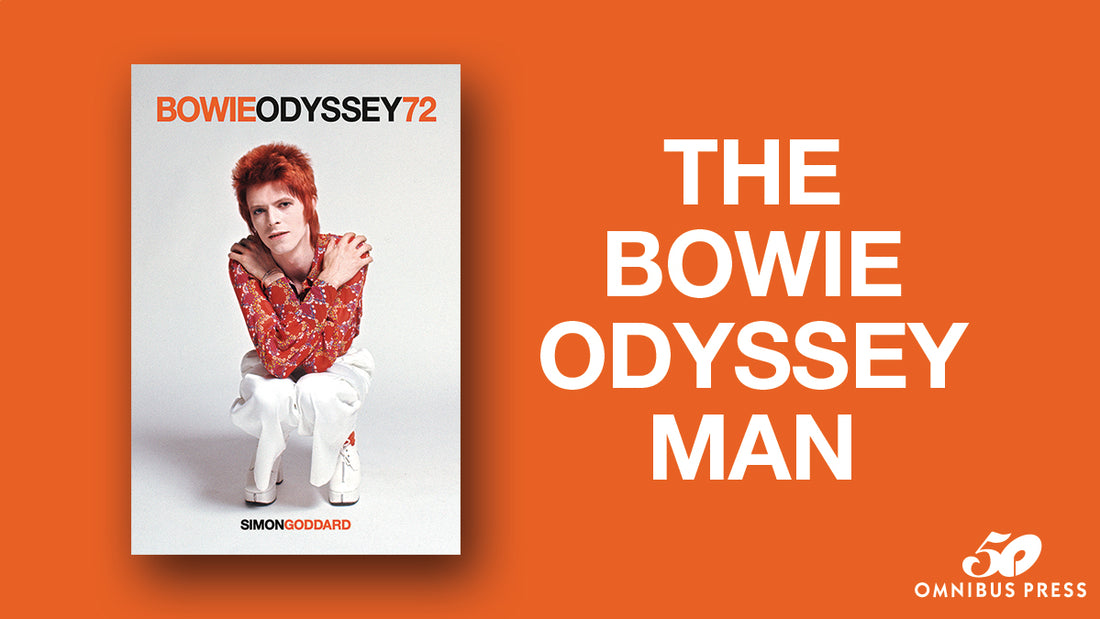
The Bowie Odyssey Man - An Author Interview
Share
As many David Bowie fans will be aware, 16 June 2022 marks 50 years since the release of his defining glam masterpiece The Rise and Fall of Ziggy Stardust and the Spiders From Mars. So it’s fitting that on the very same day Omnibus will be celebrating the Starman’s golden jubilee by publishing Bowie Odyssey 72 – the third volume of Simon Goddard’s year-by-year chronicle of Bowie’s life against the wider cultural and social history of the 1970s.
To whet our appetites for a summer of Stardust, we had a quick chat with Simon about Ziggy, the Seventies and his own ongoing odyssey as, already, the author of more Bowie books than any other writer…
What first gave you the idea to try and write a ten-book series about Bowie in every year of the Seventies?
You did! It was an email from yourselves in January 2019. Credit where it’s due, a Bowie decalogy was Omnibus’s idea but as I understand it you didn’t know who’d be mad enough to take it on. Then you knocked on my inbox.
What was your initial reaction?
Intrigued, but also a bit wary, only because one of the greatest lessons Bowie ever taught us is that creative hell is being pigeonholed doing the same thing year in year out.
So what made you say “yes”?
I gave it a lot of thought about how a series could be genuinely different to all the biographies already out there, otherwise there wouldn’t have been any point. The funny thing is I’d always wanted to write an epic saga about the Seventies, the decade I was born, but my own ideas were very vague. But it was only after you offered me this it hit me that Bowie had been staring me in the face all along as the perfect vehicle to hang the story of the Seventies on.
That’s what made it unique for me, a chance to isolate Bowie one year at a time, not looking at him in terms of forwards and backwards in his career but sideways in terms of where he is and what’s going on around him. So a new understanding of Bowie, the times he lived in, how he changed them, how they changed him, re-examining his rise in slower motion and with a wider lens.
Also I knew it wouldn’t be easy, which was part of the attraction, the sheer challenge of it. Nothing Bowie did was easy. He was all about taking risks, trying bold new ways, avoiding cliches, embracing accidents, not being afraid of failure. So I took it on in that same spirit.
How do you begin the writing process of each book?
The research takes as long as the actual writing, if not longer. I’m on a yearly cycle so I can’t dawdle. I pretty much have to “live” each year so it’s like having a strange medical condition where I’m a man whose brain is forever preoccupied half a century behind his time.
What do you look for when you’re researching?
The drama and the detail. The books are factual but they’re not academic, they’re written as entertainment. A lot of people have described them as “novelistic” and I wouldn’t disagree. Even though I’ve spent 20-odd years as a music journalist, as a non-fiction author I’m much more influenced by fiction and film. So I look for Bowie’s story, and then look at the year and then weave his central story in and out of what else is going on.
Now that you’ve written the first three books, how does each book differ?
Each one definitely has its own themes. Odyssey 70 starts with his family and who David is, or was, at the end of the Sixties, but it’s mainly a book about deconstruction, how he gradually wipes his slate clean and severs old ties so he can start again. Odyssey 71 is about regeneration, finding his path, gathering his weaponry to become a superstar. With Odyssey 72 the theme shifts to the axis of fame, fans and the media.
Because in Bowie Odyssey 72 we finally get to meet Ziggy Stardust?
Yes, it’s the Ziggy year at last, so after the first two books where David’s been struggling in the wilderness, in this one he finally becomes a star. I think with every successive book the drama steps up, as it did in Bowie’s life in the Seventies, so 1972 is when the action really starts to accelerate. Like the previous books there’s some funny stuff, some heavy stuff, some sad stuff, some weird stuff and a fair bit of jumping around inside various character’s heads.
And the same dream support cast of Marc, Iggy and Lou who I love writing about just as much as Bowie himself. Bolan especially. To have been 14 and female in 1972 with a ticket to a T. Rex concert must have been very close to the pinnacle of human happiness.
Bowie Odyssey 72 is your second book on Ziggy Stardust after your earlier Ziggyology. How different are they?
Very, very different. Ziggyology, which I wrote ten years ago now, was about the wider concept of Ziggy and the millennia-old history of the idea of the Starman. It was purposely cosmic and starry-eyed and looked at Ziggy from the ground upwards.
Odyssey 72 is the opposite. If anything it’s the anti-Ziggyology, from the sky downwards, taking a very clear-eyed terrestrial view of a young man called David who becomes famous through playing a character. So Ziggyology perpetuates the fairy tale whereas Odyssey 72 is the more honest platform-boots-on-ground reality. The reality being even stranger and funnier than the fairy tale.
One reviewer likened reading the Odyssey books to “wearing VR goggles”. How do you conjure that virtual reality?
Writing in the present tense gives them that immediacy. I didn’t plan to, it was only because my first stabs at Odyssey 70 felt a bit dead so I changed the tense and both it, and David, literally came to life. It helps transport the reader so they’re not reading about the Seventies from a safe distance but mentally experiencing them in real time. So each book is its own time machine to the authentic warts and all Seventies, with all its antiquated language and attitudes, in context, uncensored. The sounds, the sights, the stench. All of it.
Does being born in the Seventies yourself help?
Yes and no. I was born in 1971 so the Seventies is the world as I first experienced it, but I’m not sentimental or overly nostalgic about them, and without being consciously anti-nostalgic I’m consciously not trying to be nostalgic. Nostalgia is a very unreliable witness to history, like when people on TV harp on about the Seventies it’s usually “ah, space hoppers and Spangles!” It’s never “ah, Bloody Sunday and queer-bashing!” is it?
So without wishing to stamp on anyone’s rose-tinted spectacles I’m trying to paint as true a picture as I can. Like that famous Hemingway quote where he said for a writer to get the actual feeling of life across they must show the bad and the ugly as well as the beautiful. That’s the essence of it for me. In polarised sharp relief, as I’m presenting it on the page, it also makes what Bowie did even more heroic.
So what was life in 1972 like?
Very much depends who and where you were. Great if you were a young David Cassidy fan chucking yourself in the Thames to get closer to his yacht. Not so great if you were an Asian fleeing Idi Amin’s Uganda only to land in a country where folk were marching in the streets to send you straight back.
So in Odyssey 72 the plot zigzags back and forth between Bowie’s adventures and everything from the national fuel crisis and the murder of a transsexual prostitute to Margaret Thatcher and Love Thy Neighbour. Which all tells us something good or bad, shocking or ridiculous, about the time when the Ziggy Stardust album was first received and the society that first received it.
The book’s not about what Bowie means to us now, it’s about what Bowie meant back then and how it must have felt at that first moment of impact. Putting the reader smack bang right back there.
What’s the best thing you’ve learned about Bowie so far writing the Odyssey books?
I’ve heard eyewitness testimony that he sometimes watched Grandstand. I just love the thought of it. David at home in Haddon Hall, feet up on his chaise longue in a Mr Fish dress, watching Frank Bough.
After three books in three years, have you suffered any “Bowie fatigue” yet?
No. I’m an author and it’s my work and when my working day stops I switch Bowie off, although it’s not always easy. Only the other weekend I was walking in the park when a big friendly dog came lolloping up and jumped up at me. The owner ran over to call the dog off and yelled “Get down, Ziggy!” So what can you do? But because for me each book means time travelling to a different year I don’t get bored. That’s why I love working on them, more so than any of the other books I’ve written before, and as long as I do and as long as people want to read them then I’m happy to plough on towards the distant horizon of 1979.
Once Bowie Odyssey 79 is finished, would you be tempted to keep his story going into the 1980s?
Ask me again in seven years… if I get there.
Bowie Odyssey 72 by Simon Goddard is available for pre-order in paperback and limited edition collector’s hardback here.
